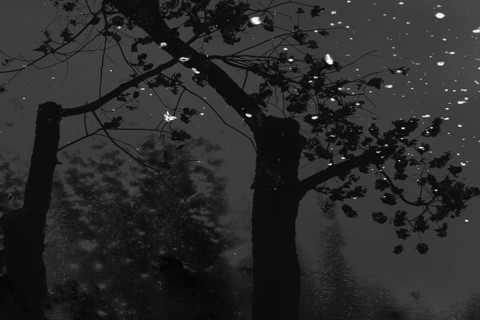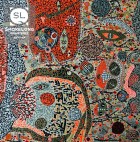He is a cutting man.
It’s Sunday so he left Ma’s room early, when the sun was coming up. Sometimes, I hear him start his truck and leave us. It takes him all morning. When he comes back, he’s dirty, with a fresh load of white oak, cut and neatly placed in his truck.
He is a tree cutter.
Around here “we call ˈem tree cutters,” he says, when he gets to telling stories about his childhood and his younger brother. “Never call ˈem anything else.” He mumbles to himself, forking Ma’s casserole into his face. “Never call ˈem anything else,” he slurs sitting crookedly on the couch, his breath sweet like maple syrup. “Lumberjack was what you called my daddy, he didn’t have none of this new shit, no machines, jusˈ an axe,” he mutters, his gaze conflicted and heavy.
Tree cutters are the men who work in the thick and come home late.
He cuts to keep us warm.
From my bedroom window I watch him empty his morning haul, the wood needed for our stove. One by one he carries the bigger pieces to the chopping block. He grips his axe tightly and positions himself. His shoulders are relaxed. He raises his axe slowly, drawing a deep long breath, and then he stills. I hold my breath tight. With careful violence he crashes down on the oak and splits it into two even halves. He repeats this motion for an hour. When he finishes he slumps over.
His daddy would be proud.
The trees cut too.
Few years ago, while he was driving me back from getting eggs in town he stopped his truck somewhere near twenty-seventh regional road, out in the thick between town and home. “I wanna show you something,” he said, pointing to a small opening. He grabbed my wrist with one of his rough, calloused hands, yanking me towards a path forgotten long ago. “Where we going?” I asked, his grip on my wrist getting tighter, his nails cutting deeper with every turn. Dusk was settling in. We were running out of light. When he stopped, dead in front of me, I tripped into him, his elbow catching me on my top lip, splitting it.
“That’s where it killed him. My baby brother. Cracked his skull right open,” he whispered.
“Sometimes, they fall wrong.” We were standing over a dead tree, now covered by the same thick that was all around us. I could see the scars left over from the chainsaw teeth on the remaining stump. “Sometimes, they cut too.” He slumped to the ground, his calloused grip even tighter around my wrist.
We returned home in silence. He drove with one hand.
That night, I replayed the violence over and over, running my tongue over the dried blood on my cut lip.
He cut my door down.
I pretended to be asleep but felt him standing in my doorway. He moved through my room. A low growl formed in his throat, all his pain and anger trying to show teeth. I spun around and stood up. I grabbed his wrist with my soft hand and pulled him in.
I burned deep like white oak when he cut me open, when he cut deep into to me. I spilled out and into all the cuts his brother left. The cuts his lumberjack daddy opened. He howled when it was over. His grip loosened. My room smelled sweet like maple syrup after.
He cut her out.
Ma saw how his eyes followed me. Some days I heard her crying through the wall.
He had cut a baby into her. “We’re gonna be happy again,” she’d whisper to me as she cooked, as I held my tongue. Her breath was sweet like maple syrup. When my baby sister came she was all twisted like tree roots, holding her breath too tight. The doctor said she suffocated, that she was underweight and came too early. Ma blamed him. For cutting his way into her life and into her. For letting the thick seep into all the little cuts he left with her. For letting the doctors cut my baby sister out of her and take her away.
She too burned like white oak.
He cut his way in.
He used to pick her up in the kitchen, spin her around then drop her to her feet and watch her wobble around. We would laugh. He was a proud tree cutter then, just like his daddy. Ma would make these big meals with seven or eight plates on the table, all with something different in them. In the evenings, he’d pull out his harmonica and Ma would grab her spoons and they’d play for hours. Only me and the thick, falling asleep to their song.
I cut into myself.
He has cut life into me this time. In there he has placed the thick between the town and home. He has placed his daddy and brother. He has placed white oak. He has placed his harmonica and Ma’s spoons. Maybe he has placed his brother and my baby sister and sweet maple syrup.
Maybe my baby will be twisted like roots too. Holding her breath too tight.
But I know how to cut. I’ve been watching him. I know to cut deep and cut long.

Notes from Guest Reader Charmaine Wilkerson
I was entranced by the haunting, assured telling of this story and its unusual structural approach.


 The SmokeLong Grand Micro Contest (The Mikey) is now an annual competition celebrating and compensating the best micro fiction and nonfiction online.
The SmokeLong Grand Micro Contest (The Mikey) is now an annual competition celebrating and compensating the best micro fiction and nonfiction online.